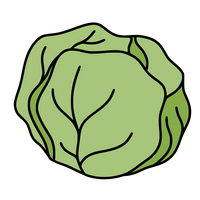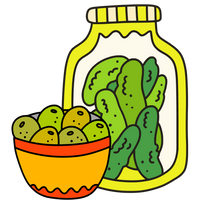
Fermented foods are all the rage right now and for good reason! They’re packed with gut-friendly probiotics, vitamins, minerals and enzymes that can improve your digestion and overall health.
If you’re like most people, you probably don’t have time to ferment your own food. That’s where Olive My Pickle comes in – we make real, healthy fermented foods using traditional fermentation methods.
Our products are handcrafted and hand packaged to ensure the highest quality and freshest flavor. Plus, we only use the best ingredients – so you can be sure that what you’re eating is not only delicious but also good for you.
If you want to learn more about fermentation, we've written a few blog posts over the past 12 years in business about that very thing. Let us answer some of your top questions here.
What is Fermentation?
You may have heard of fermentation in relation to yogurt, pickles or even beer but what is fermentation?
Fermentation is a process where microorganisms like yeast or bacteria break down carbohydrates in the absence of oxygen to produce lactic acid. This process can happen naturally in foods as they age or we can intentionally create an environment for fermentation to occur.
At Olive My Pickle, we specialize in lacto-fermentation, also known simply as fermentation.
'Lacto' is short for 'lactic acid', which describes the type of probiotic bacteria that that naturally develops during fermentation. It doesn't have anything to do with lactose, whey or milk. While we're on that subject, all of Olive My Pickle's products are 100% plant-based.
Fermentation preserves vegetables with salt water brine. It produces a much different end result than "pickling," which uses vinegar, sugar and/or heat canning methods to "cook" the pickles.
A fermented pickle is not cooked, rather it is raw and unpasteurized, alive and teeming with good bacteria. A non-fermented pickle is a high sodium, often sugar-laden, dead cucumber floating in acidic vinegar with (sometimes) Yellow Dye 5, a food additive whose consumption has been researched to correlate to hyperactivity in kids, among other things.
Fermentation is an age old tradition of preserving food. We like to think of it as a way to keep your gut healthy the old fashioned way in our modern fast paced times.
Fermentation can be done in 2 ways
There are two types of fermentation: lacto-fermentation and alcohol fermentation. In lacto-fermentation, bacteria convert sugars into lactic acid. This process preserves the food and gives its unique taste. Alcohol fermentation is slightly different; yeast converts sugars into alcohol. This process is often used to make beer and wine. Both types of fermentation help to extend the shelf life of food and can create unique flavor profiles.
Your Top 7 Questions About Lacto Fermentation, Answered
What is lactic acid bacteria?
Lactic acid bacteria is a type of probiotic that is beneficial for gut health. It is found in fermented foods such as yogurt, sauerkraut, and kimchi, and can also be taken in supplement form.
Looking for some answers about lacto fermentation? You've come to the right place! We've rounded up our top 7 questions about this essential gut health practice - and provided some helpful answers. So read on, and get ready to get your ferment on!
Fermenting vegetables at home
Like we've mentioned above, fermenting vegetables is a process that has been used for centuries to preserve food. This is how the generations before us stored and saved food.
The process is actually quite simple yet most people today do not want to ferment at home.
Vegetables are placed in a jar or container with water and salt, and then left to ferment for a period of time. During this process, the bacteria that are present on the vegetables break down the sugars and create lactic acid, which acts as a preservative.
Eating fermented vegetables can be an excellent way to add beneficial probiotics to your diet, but there are a few things to keep in mind if you're fermenting at home.
Pro Tip
First, be sure to use clean jars and utensils, as contaminants can cause the fermentation process to fail. Second, make sure that the vegetables are completely submerged in the brine solution; otherwise, they may mold. Finally, be sure to monitor the fermenting vegetables closely, as they can become sour if left to ferment for too long. With these tips in mind, fermenting vegetables at home can be a fun and easy way to add good bacteria to your diet.
Are Fermented Foods Safe? The Truth About Harmful Bacteria
Are fermented foods safe? It's a valid question, given that fermentation involves bacteria. However, the reality is that many bacteria are actually beneficial for gut health - and eating fermented foods can offer some serious health benefits. In this post, we'll set the record straight on fermented foods and gut health.
The short answer is yes, fermented foods are intrinsically safe based on their ph level of 3.5. However, it is important to know the facts about pasteurization and what to look for when buying fermented foods. We break it down for you here.
How to Care for Your Fermented Foods for Gut Health
Many people don't know how to take care of their fermented foods, so they may end up going bad or get tossed out which is unfortunate and unnecessary.
Fermented foods are alive and contain live microorganisms, which is why they demonstrate lively behaviors and personality! Ferments have plenty going on under those surface appearances that might surprise even the most seasoned consumer and pickle enthusiast alike!
These behaviors and signs of life are often misunderstood and seen as defects with the product. Quite the contrary, these are normal, predictable signs of life, indications that something has gone right with the ferment. But they can certainly catch you off guard if you're new to fermented foods.
We're here to break it down for you and let you in on what's normal and to be expected with live culture foods and the main things you need to know to best take care of your fermented products. By the end of this article, you'll be a fermentation expert!
If you're not taking care of your fermented foods properly, you may miss out on the gut health benefits you want.
Olive My Pickle is here to help. We'll show you how to take care of your ferments so that they stay healthy and delicious. Here's a few easy ferment safety tips to consider and how to keep your ferments happy.

How Are Probiotics Created During Fermentation? We Break It Down
Have you ever wondered how those probiotics in your favorite yogurt or fermented pickles are created? The process is called fermentation, and it's pretty neat.
We break it down for you in this blog post. Probiotics are live bacteria that can offer a host of health benefits, so it's worth understanding how they're made. Keep reading to learn more!
And if you're feeling "gutsy," check out our list of probiotic-rich foods in this post. (We love puns... and couldn't resist.)

Why Did My Fermented Pickle Batch Fail? Four Things That Will Make or Break Your Fermented Vegetables
Have you ever tried your hand at fermentation, only to have your batch come out mushy and flavorless? If so, you're not alone. Fermentation is an art, and one that takes practice (and a bit of trial and error) to master. In this post, we'll take a look at four factors that can make or break your ferment. By troubleshooting your process and making adjustments as needed, you can hopefully avoid future batch fails. Let's get started!

How Do You Measure the Probiotics in the Pickles?
You know that old saying, "you are what you eat?" Well, it turns out that may be more true than we thought. Our gut health has a big impact on our overall health and well-being. In recent years, probiotics have become a popular way to promote gut health. But how do you know if the probiotics in your food are actually doing anything? Let's take a closer look at the science behind probiotics and see how we can measure their effectiveness.
What is Fermentation? Here's a Glossary of Important Terms
Are you interested in learning more about fermentation? Perhaps you're already familiar with the basics, but want to know more about the different types of fermentation. Either way, this blog post is for you! Here, we'll provide a glossary of important fermentation terms, so that you can become an expert on all things gut health. Read on to learn more!
The benefits of eating fermented foods are many.
Fermented foods are live foods that contain beneficial probiotics. The best part of adding ferments to your every day eating habits is that you get to enjoy delicious and healthy food! So go ahead and give your gut some love with a traditional food like fermented pickles, olives, sauerkraut or kimchi. Your gut will thank you for it!
Do you have questions we didn't answer in this fermented and fermentation the ultimate guide?
Add the health benefits of fermented food to your daily life today.











